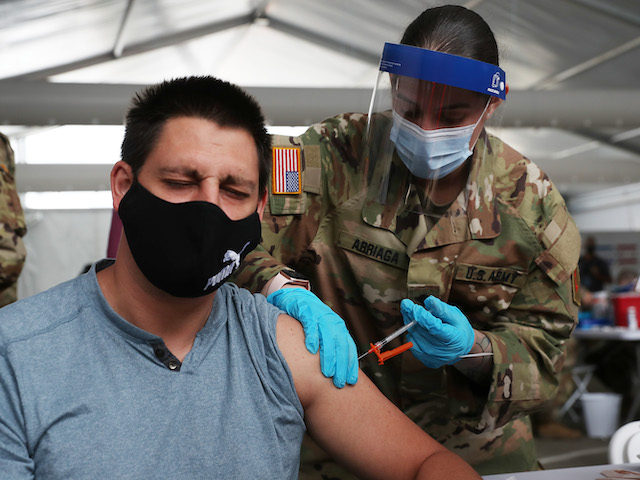The Biden Pentagon announced late Thursday it is now requiring that service members divulge whether they have been vaccinated or not, or else submit to regular coronavirus testing and travel restrictions.
Deputy Pentagon Press Secretary Jamal Brown said in a statement:
The Department of Defense is moving quickly to meet President Biden’s commitment to defeat COVID-19, and that includes being able to ensure every member of our civilian and military workforce is protected.
In accordance with the guidance the President issued today, all military and civilian DoD personnel will be asked to attest to their vaccination status. Personnel unable or unwilling to do that will be required to wear a mask, physically distance, comply with a regular testing requirement and be subject to official travel restrictions.
The announcement came after President Joe Biden directed the Department of Defense to look into “how and when” the coronavirus vaccines will be added to the list of mandatory vaccinations for the military, and for every federal government employee and federal contractor to attest to their vaccination status.
“It’s time to impose requirements on key groups to make sure they’re vaccinated,” Biden said.
He then framed it as a matter of service members’ own protection:
Our men and women in uniform who protect this country from grave threats should be protected as much as possible from getting COVID-19. I think this is particularly important because our troops serve in places throughout the world, many where vaccination rates are low and disease is prevalent.
Brown said Defense Secretary Lloyd Austin will consult with medical professionals and the Joint Chiefs of Staff to determine “how and when” to make recommendations to Biden on adding the coronavirus vaccines to the “full list of requirements for military personnel.”
“In the meantime, we continue to offer vaccines to our personnel and their families around the world. And we will continue to adjust our protocols to the local conditions of the communities we serve in,” he said.
“COVID-19 remains a significant and evolving threat to our nation’s security. The rise of the Delta variant and the speed with which it transmits make these additional protective efforts all the more vital to protecting our force and the nation we defend,” he added. “Vaccines remain the best and most effective way to prevent the spread of COVID, including the Delta variant.”
According to a recent Atlantic article, fewer than 70 percent of active-duty troops had received at least one dose of a coronavirus vaccine as of June 30, but the percentage was much smaller when National Guard and Reserve components were included — 51 percent.
The article listed one reason for the percentage:
One practical reason that vaccinations in the military lag the general population is that service members are younger and healthier. Across the country, young adults, who have a relatively low risk of death from serious disease, have substantially lower vaccination rates than older adults. The national median age is about 38. Enlisted men and women in the U.S. military as a whole are, on average, 27. The average age of even officers in the U.S. military is 34.5.
But it said the main drivers of vaccine refusal were that service members were distrustful of the vaccines’ development or timeline, or had concerns about its safety and preferred to wait. Some did not believe the coronavirus was a threat to them or their families, and some distrusted most or all vaccines.
To date, only 28 active-duty members of the military have died from the coronavirus, according to Department of Defense statistics. An additional 345 DOD civilians, dependents, or contractors have died.
Earlier this week, the Pentagon implemented a department-wide indoors mask mandate for all individuals, regardless of vaccination status, on all military installations in areas of substantial or high risk of COVID-19 spread as defined by the Centers for Disease Control (CDC), which included the Pentagon reservation.
Follow Breitbart News’s Kristina Wong on Twitter or on Facebook.

COMMENTS
Please let us know if you're having issues with commenting.